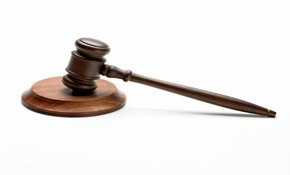John Humphrys asks: Is the addition of cameras in court a positive for justice?
A historic change in the way we conduct trials has taken place this week. For the first time, television cameras were allowed in an English court. For now at least, tight controls are being placed on when and where this can happen. Even so, is this development an enhancement of our system of justice or does it threaten that very system? And is the reform too restrictive?
Even before television became a viable proposition in the 1930s, a ban had already been placed on allowing any recording of what goes on in British Courts. The 1925 Criminal Justice Act prohibited all filming and recording of trial proceedings. Not even still photographs could be taken, hence those artists’ sketches we still see in newspapers of defendants sitting in the dock; and even these have to be drawn from memory.
To many people, this ban has long seemed perverse, even contradictory of the principles of justice. After all it is not as if trials are conducted in secret. One of the great axioms of the justice system is that justice must not only be done but be seen to be done and this is why courts are open for the public to attend. Journalists are allowed to write reports of the proceedings; indeed it is one of the tasks often first given to young rookie reporters to sit in court all day and write it up if something interesting happens. So if that is all right, why not let the cameras in?
This week they will at last be able to do so. James Harding, the BBC’s director of news and current affairs, has described it as ‘a landmark moment for justice and journalism’.
But this new freedom will be very circumscribed. The cameras will be allowed only into the Appeal Court. It will require the consent of the judge presiding and the cameras will have to be turned off if there is any chance that the result of the appeal will be a retrial. Even when the cameras are on they will be allowed to focus only on the judge and the lawyers engaged in the case and not on the defendant or anyone else. There will be a 70-second delay before any transmission of the images and those images can be used only for the purposes of news and current affairs.
Why is there such caution? One of the arguments used by those who are fundamentally sceptical about the whole development is that the presence of cameras could distort the very nature of the process. In particular, it has been argued that televising the events could act as a deterrent to victims and witnesses giving evidence and that is why a ban has been put on their being shown. Indeed one of the reasons why the opening up of the courts to television has been restricted to the Appeal Court is that that is a forum where most of the action takes place between judges and lawyers.
In fact it is not strictly true to say that this is the first time the cameras have been rolling in British courts. The Supreme Court, created by the last Labour government to take over the old House of Lords judicial function, has been televised since its inception in 2009. And in Scotland cameras have been allowed in courts since 1992 but only with the unanimous consent of all those involved and that has not often been forthcoming.
To many people this caution is extraordinary. Other countries allow much more freedom in opening up courts to public surveillance via television and there it would seem an affront to restrict it. In the United States, for example, the televising of court cases is routine and sensational trials, such as that of O J Simpson, have attracted enormous audiences. Some people might think that the phone-hacking trial that opened this week at the Old Bailey involving, among others, Rebekah Brooks and Andy Coulson, both formerly of the News of the World, is an obvious example of where evident public interest should be being catered for by the presence of cameras.
One day this may possibly be the case. This week’s innovation is, in a sense, an experiment. If it is judged to have worked, then there is the chance that television would be allowed to broadcast criminal and civil trials in the high court. Whether or not this happens will be up to the judiciary, however. Britain’s system of government prides itself on the independence of the judiciary from both government and parliament and the judges argue that it is their responsibility, and theirs alone, to ensure that the judicial system works as it should. Even if there is a clamour from the public and from elected politicians for the restrictions to be eased, many judges are likely to hold out against it. A clash could well arise between popular opinion and what the judges would see as their duty and that could raise questions of who is supposed to decide what in a democracy.
Equally, it could be that the experiment will be considered a failure. There are those who already have strong doubts, notwithstanding the restrictions that have been put in place. Helena Kennedy, the QC and Labour peer, has expressed strong doubts about the whole idea. She is worried lest court cases become ‘entertainment for the masses’, which is what many think the OJ Simpson trial did indeed become.
Whether that happens may depend on how broadcasters choose to use the material they are now being allowed to record. It may turn out that much of it is just too boring to merit inclusion in news broadcasts or even within current affairs programmes.
What's your view?
- Do you think this is a long overdue innovation or a development that should make us alarmed about the future of the judicial system?
- Do you think the restrictions are the right ones to impose at this stage or not?
- Do you think judges should decide whether trials should be televised or should it be for our elected representatives in parliament?
- When you see recordings of trials in other countries, such as the United States, does it make you feel their system is more open and transparent or that it is vulnerable to being turned into entertainment?
- Would you want to watch the current phone-hacking trial if it were being televised?
- If you yourself were involved in a trial, would you want it to be televised?
- And do you think we will end up with all our trials televised, or do you think there will be such little interest no one will want to bother?










